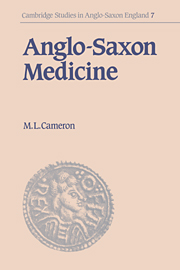Book contents
- Frontmatter
- Contents
- Preface
- Acknowledgements
- List of abbreviations
- 1 Introduction
- 2 Conditions for health and disease
- 3 Physician and patient
- 4 The earliest notices of Anglo-Saxon medical practice
- 5 Medical texts of the Anglo-Saxons
- 6 Compilations in Old English
- 7 Compilations in Latin
- 8 Latin works translated into Old English: Herbarium and Peri Didaxeon
- 9 Sources for Old English texts
- 10 Making a Leechbook
- 11 Materia medica
- 12 Rational medicine
- 13 Magical medicine
- 14 The humours and bloodletting
- 15 Surgery
- 16 Gynaecology and obstetrics
- 17 Conclusions
- Appendix 1 Quotations for ch. 10
- Appendix 2 Quotations for ch. 13
- Appendix 3 Quotations for ch. 14
- Appendix 4 Quotation for ch. 15
- Bibliography
- Index
16 - Gynaecology and obstetrics
Published online by Cambridge University Press: 30 September 2009
- Frontmatter
- Contents
- Preface
- Acknowledgements
- List of abbreviations
- 1 Introduction
- 2 Conditions for health and disease
- 3 Physician and patient
- 4 The earliest notices of Anglo-Saxon medical practice
- 5 Medical texts of the Anglo-Saxons
- 6 Compilations in Old English
- 7 Compilations in Latin
- 8 Latin works translated into Old English: Herbarium and Peri Didaxeon
- 9 Sources for Old English texts
- 10 Making a Leechbook
- 11 Materia medica
- 12 Rational medicine
- 13 Magical medicine
- 14 The humours and bloodletting
- 15 Surgery
- 16 Gynaecology and obstetrics
- 17 Conclusions
- Appendix 1 Quotations for ch. 10
- Appendix 2 Quotations for ch. 13
- Appendix 3 Quotations for ch. 14
- Appendix 4 Quotation for ch. 15
- Bibliography
- Index
Summary
Very often it comes about through the might of God that a man and woman produce a child in the world.
Not much gynaecological medicine survives from Anglo-Saxon England. The lost section of Bald's Leechbook contained most of that collection's material on women's complaints. We can appreciate our loss when we read the table of contents for the missing ch. 60 of bk II:
Medicines for obstruction of women's genitalia and for all infirmities of women: if a woman cannot bear a child, or if a child become dead in a woman's innards, or if she cannot bring it forth, put on her girdle these prayers as it is said in these Leechbooks; and numerous signs how one may know whether it will be a male child or a female child, and for disease of women, and if a woman cannot urinate, and if a woman cannot promptly be cleansed [of afterbirth], and for haemorrhage in a woman, and if a woman is out of her mind, and if you wish a woman to have a child or a bitch a cub, or if a woman's womb become enlarged, or if a woman suddenly become silent; forty-one remedies.
The best we can do to recover something of what has been lost here is to gather from other documents all references to women's diseases and examine them. Leechbook III gives most of what remains, apart from some charm material in Lacnunga, scattered recipes in the Herbarium and some ‘fly leaf leechdoms’, as Cockayne called them.
- Type
- Chapter
- Information
- Anglo-Saxon Medicine , pp. 174 - 184Publisher: Cambridge University PressPrint publication year: 1993

